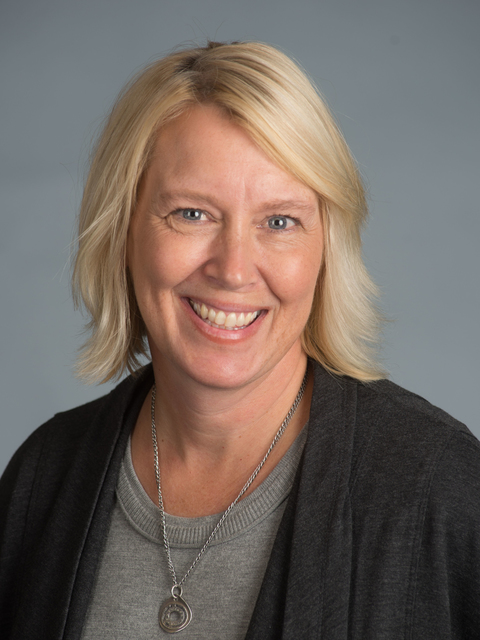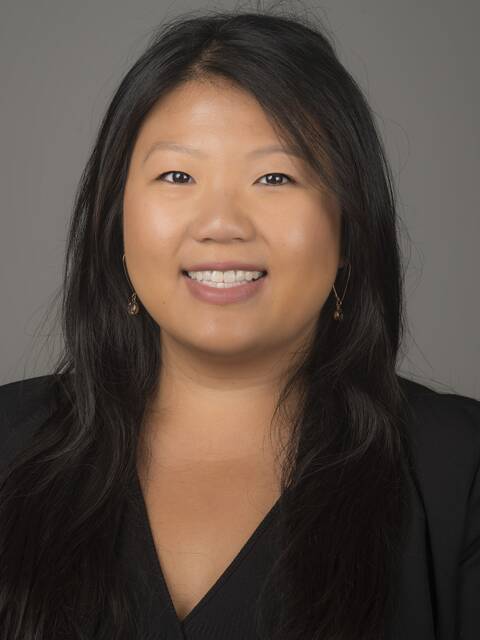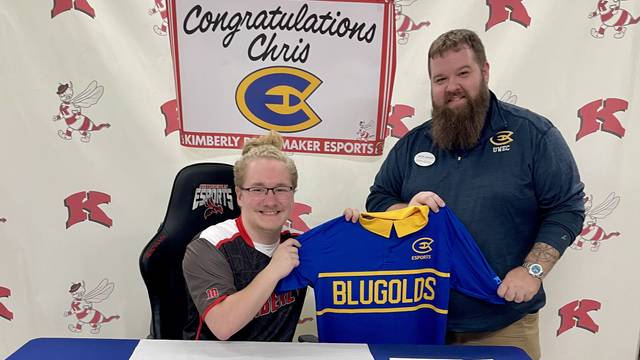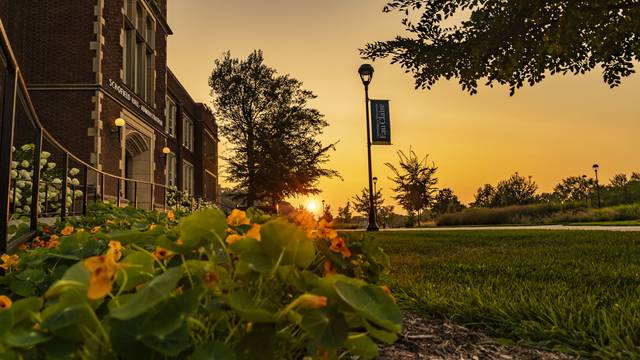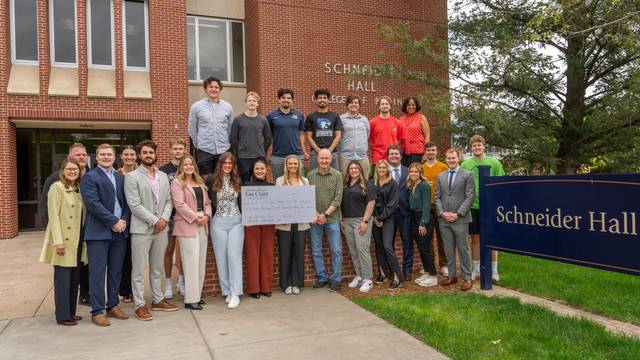Zachary Weerts and Kaylin Sonen felt prepared for a lot of things when they joined a Winterim immersion program that would take them to Fort McCoy to spend time with Afghans as they begin adjusting to their new lives in the United States.
The University of Wisconsin-Eau Claire seniors had readied themselves as best they could to offer their friendship as they listened to heartbreaking stories of trauma and loss during the two-week program.
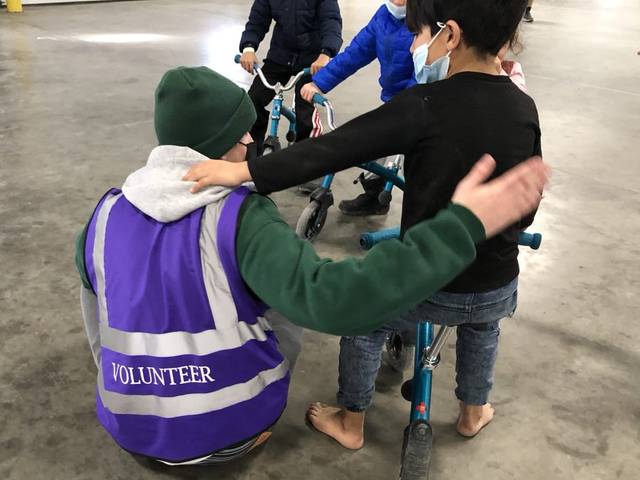
In January, UW-Eau Claire students and faculty spent two weeks with Afghan families who are living at Fort McCoy as they go through the process of relocating to the U.S. (Submitted photo)
What they weren’t prepared for was the laughter, joy, kindness, resiliency and generosity they found in the Afghan men, women and children who surrounded them each day.
“Going into it, I imagined it would be a somber and sorrowful experience because of what they’ve been through,” says Weerts, a political science-world politics major from Delavan. “But the opposite was the case. They were excited and happy. The kids were all over us, wanting to connect with us, wanting to color or play soccer.”
Before the immersion, Sonen read a lot about thousands of Afghans’ chaotic and terrifying journey as they fled their home country. She assumed the people she met at Fort McCoy would be struggling just to get through the day. So, like Weerts, she was surprised to find so much joy and kindness.
“My biggest takeaway from the immersion is how giving these people still are and how kind they are even though they’ve experienced a lot of pain,” says Sonen, an international business major and Japanese minor from Apple Valley, Minnesota. “They still have fun. They still are the people they are, and they still bring joy wherever they go.”
A new opportunity
The "Understanding the Refugee Experience in Western Wisconsin" immersion was an "impromptu" program put together by faculty and staff at the suggestion of John Rosenow, a Buffalo County dairy farmer and longtime university partner, says Dr. Jeff DeGrave, UW-Eau Claire’s intercultural immersions coordinator.
“Most of John’s workers are migrant laborers from Latin America,” DeGrave says. “He has been the vanguard of not only employing migrant labor in the region but ensuring their fair treatment and investing in them as people, not just as laborers.”
So, when Rosenow saw an opportunity for Blugolds to support Afghans temporarily living in western Wisconsin, faculty and staff quickly began making the necessary connections. UW-Eau Claire’s Council on Internationalization and Global Engagement and Intercultural Immersions Office coordinated with Catholic Charities and Fort McCoy to build the program.
“Interacting with people who have been directly impacted by U.S. foreign policy decisions who are now here, starting their lives all over again in an unfamiliar place, provided an incredibly rare opportunity for students to participate in a meaningful international immersive experience without leaving the state of Wisconsin,” DeGrave says. “The idea wasn’t to teach, save, offer advice or solve problems. The goal was to share, support each other and to learn together. It was truly a ‘once-in-a-lifetime’ experience.”
Twenty-six UW-Eau Claire students from many majors were part of the January program. The faculty leaders were Dr. Kranti Dugar, assistant professor of management and marketing; Dr. Frances Hawes, assistant professor of health care administration; and Christopher Jones, a lecturer of kinesiology. Dr. Mary Hoeft, professor emeritus of communication and journalism, also assisted with the program.
Building connections and understanding
Since August, thousands of Afghan men, women and children have lived at the Fort McCoy military base, a temporary home for them as resettlement agencies work to secure housing, services and other care necessary to meet their needs in communities throughout the U.S.
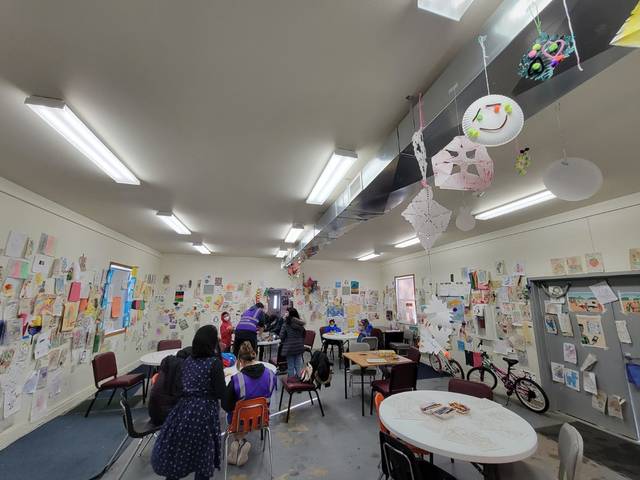
Students did art projects with Afghan children during their two-week immersion. (Submitted photo)
Every morning during the 12-day immersion, students — who lived on the base the first week and in nearby hotels the second week — were assigned to different centers, where Afghan guests gathered to sew, play, learn or engage in other activities. The Blugolds joined them in their activities, whether it was playing soccer, drawing, learning or simply sharing stories and information.
“This is about as international of an experience that one can have in their own backyard,” Dugar says of the immersion at Fort McCoy, located about an hour from UW-Eau Claire’s campus.
The immersion program gave them an extraordinary behind-the-scenes look at what it takes to support thousands of refugees as they transition to their new lives in the U.S., says Weerts, who is a member of UW-Eau Claire’s Student Senate leadership team. That, he says, is not something he ever could learn in a classroom.
While the entire experience was incredible, Sonen says talking with women in the women and children’s center was especially meaningful. Hearing about their lives in Afghanistan and their experiences in America was heartbreaking yet inspiring, she says, describing the women as having “so much courage.”
“I have a lot of confused feelings,” Sonen says. “I was upset listening to them talk about what happened to them, to their friends and family. I tried to handle it by staying calm and really listening to what they had to say and letting them tell me everything they needed me to hear.”
Since art often helps her manage her emotions, Sonen also enjoyed her time working with kids in the art center. She had them draw pictures to match certain words, like farm or lake, using art to teach them a few English words. Before she left, they turned the kids’ artwork into a giant mural for the art center’s wall.
Playing sports like soccer and volleyball also helped the UW-Eau Claire volunteers connect with the Afghan guests. Dugar, who grew up playing cricket in India, knew the sport now is popular in Afghanistan, so he brought cricket sets to share with the kids.
“Their eyes lit up,” Dugar says. “It brought back a simple physical activity that had been part of their daily lives before they came here. At the end of the day, we were all tired but a happy tired.”
Weerts says the people he met constantly surprised him. For example, as he listened to 5-year-olds talk about the Taliban and the Afghan army, he realized how much the young boys already understood about complicated global issues.
Another day, Weerts was leading a science lesson when a man joined the group and began working on the activity alongside the kids. Weerts was surprised when the man later said he’d been a math professor at a university in Afghanistan. His dream now is to teach in the U.S., so he looks for every opportunity to practice his English.
“I think about the professors we are blessed to have in Eau Claire, and how this professor was forced to flee because he taught women,” Weerts says. “It was eye-opening. He showed us crazy math equations and sat with me for hours going through fractions. He was learning English by talking with us, making sure he was saying things right. These people are so smart, so intelligent and have so much to offer.”
Students weren’t the only ones moved by the stories they heard. During an art lesson, Dugar asked a young boy to draw a picture of something relating to transportation, like a car.
“I looked down and saw him drawing an airplane and drawing himself sitting on top of the airplane,” Dugar says. “Between airplane and ground, he drew someone upside down falling. This 8-year-old boy knew how to express what he’d seen but he couldn’t talk about it.”
Another day, Dugar was sitting with a woman as her young child played nearby, when she told him that her husband, a teacher, had been killed. She then shared that she had two children, but in the chaos at the airport during the evacuation from Afghanistan, she was separated from one child and didn’t know their fate.
“This is the kind of the trauma they are dealing with,” Dugar says. “I had to go to sit in the car afterward to collect myself.”
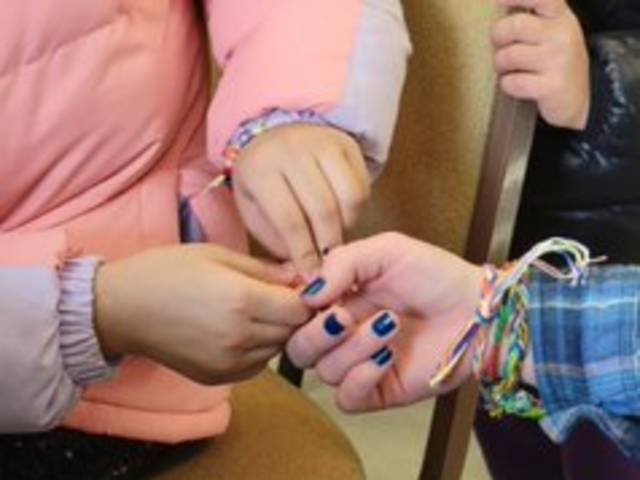
The Blugolds were touched when Afghan women and children made friendship bracelets for them. (Submitted photo)
Hawes was impressed that even when the students heard these kinds of horrific stories, they thought about how the Afghans still were so giving. They talked with people who had survived trauma but still took time to make the students friendship bracelets and to draw them pictures.
“Their kindness was really a wonderful part of the experience,” Hawes says.
As a political science major, Weerts already has studied the U.S.’s long and complicated history with Afghanistan. However, the immersion showed him that he still has so much more to learn.
“I had some knowledge of Afghanistan, but after seeing these families and interacting with them, there are a lot of things I didn’t know and would never have guessed,” Weerts says. “Many times, I had to step aside and really break down in my head what a 5-year-old child was saying. I often had to make sure that what I thought I heard was really what I heard.”
Weerts says the immersion also was a reminder that everyone — Americans included — should pay attention to what happens in other parts of the world because those events affect millions of people.
Sonen took similar lessons from the immersion, noting that “we don’t all have to spend our life helping others and volunteering every day, but we should at least pay attention.”
Sonen always has been curious about the world and the people in it, so she hopes to eventually work in the international relations field. COVID-19 has limited her travel options during college, so she appreciates that she could safely be part of an international program close to home.
“I really think experiencing other cultures is so important and changes who we are and how see we see the world,” Sonen says. “My perspective and horizons are bigger because of this experience.”
Saying he will “take this experience wherever I go,” Weerts says the Afghan people he met are inspiring him to “want to do work that will make lives better for people around the world.”
That kind of thinking and understanding is why immersions like the one at Fort McCoy are so important, DeGrave says. Allowing students to directly interact with people in such vulnerable positions due to their efforts to help the U.S. complicates the "single stories" that people might hear about U.S. interventions around the world, he says. It provides a much more nuanced understanding of the impacts such policies have on real people, he says.
Weerts agrees, saying that if students only see people from Afghanistan in the media, it can make them seem so different from Americans. Yet, the reality is that we’re more alike than different, he says.
“Honestly, this has just been a great experience to remember what it means to be human,” Weerts says.
While connecting with the Afghan guests and hearing their stories was “so, so cool,” Sonen says it didn’t feel like she was part of an historical event. “It just feels like I reached out to another person,” she says.
The value of real-world learning
Prior to the immersion, faculty and staff helped students learn more about Afghanistan and America’s ties to the country, as well as about the Afghans who are relocating in the U.S. They also educated students about trauma, so they would understand that their role was to support, not save, the Afghan guests, Dugar says.
“We prepared students to understand that we aren’t heroes,” Dugar says. “We are being human and understanding someone’s trauma. It comes back to a mindset that we're going there to learn together and hopefully grow.”
Through those discussions, students began to see the people living at the base as Afghan guests who are being relocated, not refugees who were evacuated, Dugar says. The distinction matters because seeing them as guests “goes a long way toward seeing them as contributing members of society,” he says.
“We can make mistakes and judge them to be less intelligent, but they do have skill sets and intelligence,” Dugar says. “Students met people with advanced degrees, and many of the kids already understood words and phrases in English. It’s good for us to realize that they are a little far away from us culturally so it will take time to integrate into our community. But it’s not for lack of ability or intelligence. They are capable, contributing members of society.”
Throughout the immersion, Dugar says he “saw students do incredible things.” Some struggled more than others, but they all found meaningful ways to contribute, whether that meant playing in hours-long soccer tournaments or working alone to complete a more routine housekeeping task.
“College makes you realize who you are and who you want to be,” Dugar says. “Every day you become a different person because of your experiences. So, we must expose every student to experiences that make them a better person.”
It was an honor, Hawes says, to share this immersion experience with students, especially during this historic time.
“To follow things on the news and teach it in classes and then get to experience it in a different and profound way is humbling,” says Hawes, who teaches a course on U.S. health care policy, which includes lessons on health care and refugee populations. “Honored is the main word.”
Next steps
Given the trauma so many of the Afghan guests had endured, the faculty mentors knew students would struggle to make sense of what they heard, Hawes says. So, every day during the immersion, faculty met informally and formally with the students, asking them to share the highs and lows of their day.
“Our students were there in the trenches being human with the Afghan guests,” Dugar says. “They faced many challenges, so we’d debrief. We would ask them what they loved today and what was challenging.”
By sharing the good and the bad, students could support and learn from each other.
“You can try to learn on your own, but when you learn with other people, when you discuss things, you realize you might not be the only one who has certain thoughts or is going through certain challenges,” Dugar says. “You find that you are part of that living, learning community and that other people can be a resource for you to learn from and lean on.”
The students also are writing reflection papers about their experiences during the immersion, which is another way to help them reverse the culture shock they are experiencing.
Faculty are continuing to encourage students to support one another as the new semester is underway. After such an intense and emotional two weeks, “coming back to reality isn’t always easy,” Hawes says.
“You come back a different person,” Dugar says. “Everything around you is different.”
Some students already are looking for new ways to support the Afghan guests. Some are working with groups in the city of Eau Claire to find housing in the community to meet the Afghans’ needs, and other students are presenting at a local churches or other places to share their experiences.
